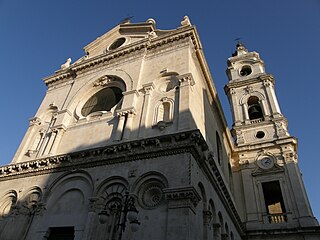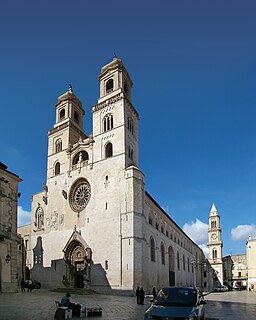
Pietro Farina (7 May 1942 − 24 September 2013) was an Italian Roman Catholic bishop.

The Italians are a Romance ethnic group and nation native to the Italian peninsula and its neighbouring insular territories. Most Italians share a common culture, history, ancestry or language. Legally, all Italian nationals are citizens of the Italian Republic, regardless of ancestry or nation of residence and may be distinguished from people of Italian descent without Italian citizenship and from ethnic Italians living in territories adjacent to the Italian Peninsula without Italian citizenship. The majority of Italian nationals are speakers of Italian, or a regional variety thereof. However, many of them also speak another regional or minority language native to Italy; although there is disagreement on the total number, according to UNESCO there are approximately 30 languages native to Italy.
Ordained to the priesthood in 1966, Farina was named bishop of the Diocese of Alife-Caiazzo, Italy, in 1999 and then Bishop of the Diocese of Caserta in 2009 where he died in office. [1]

Alife is a town and comune in the Province of Caserta (Campania), Italy. It is located in the Volturno valley, and is a flourishing centre of agricultural production.

Italy, officially the Italian Republic, is a European country consisting of a peninsula delimited by the Italian Alps and surrounded by several islands. Located in the middle of the Mediterranean sea and traversed along its length by the Apennines, Italy has a largely temperate seasonal climate. The country covers an area of 301,340 km2 (116,350 sq mi) and shares open land borders with France, Slovenia, Austria, Switzerland and the enclaved microstates of Vatican City and San Marino. Italy has a territorial exclave in Switzerland (Campione) and a maritime exclave in the Tunisian sea (Lampedusa). With around 60 million inhabitants, Italy is the fourth-most populous member state of the European Union.

Caserta is the capital of the province of Caserta in the Campania region of Italy. It is an important agricultural, commercial and industrial comune and city. Caserta is located on the edge of the Campanian plain at the foot of the Campanian Subapennine mountain range. The city is best known for the Palace of Caserta.














